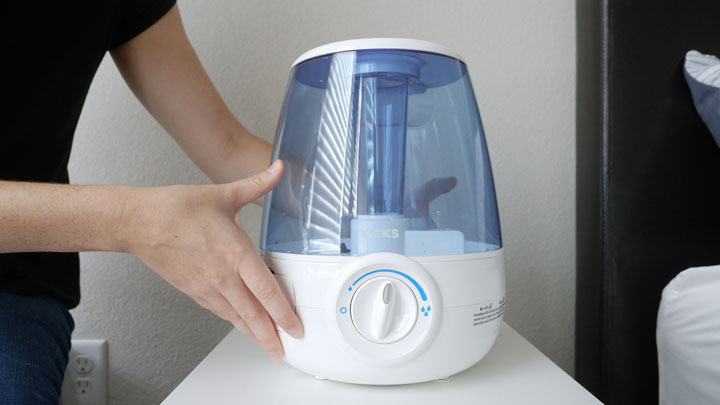Waking up in the morning with sharp pain in the back of your throat is never fun, and it can be equally challenging to decipher why you appear to have a sore throat. These days all of us will likely wonder, “Is it COVID-19?” Although this is a possibility, there are many other plausible offenders, both infectious and non-infectious.
We will explore the different possibilities as to why you may have a sore throat and help you identify the distinct symptoms and what they may mean.
Dry Throat vs Sore Throat
A dry throat can feel scratchy and irritated, and it’s often caused by mouth breathing. All of us will breathe through our mouths when our nasal passages are blocked, and this can happen because of a dry environment, allergies, a cold, or flu. A dry throat is often eased after drinking fluid or eating something fatty, because this can soothe the throat tissue.

A sore throat may also feel irritated and painful, but it often coincides with a deeper, throbbing pain, especially during swallowing. This pain will ordinarily persist even after you have hydrated and soothed your throat with food, lozenges, or medicine.
Why Do I Wake Up with a Sore Throat?
Viruses aren’t the only causes of a sore throat. Other culprits like allergies, smoke, and dry air can also make your throat feel scratchy.
Dehydration
Dehydration can be caused by not ingesting enough fluids to keep your bodily tissues soft, healthy, and lubricated. Warm air and menopausal hot flashes can also cause excessive perspiration and create dry mucous membranes. It is essential to drink enough water if you find yourself in any of these scenarios. Think about it like this: Perspiration out of the body must not be greater than fluid intake into the body.
Snoring
Snoring, which happens for various reasons, can create an irritated and sore throat because it coincides with mouth breathing. Breathing through your mouth will dry out both your mouth and throat, possibly causing your throat tissue to become inflamed and irritated. This could make your throat feel sore and scratchy in the morning.

Sleep Apnea
Sleep apnea is a complex sleep condition whereby you stop breathing while you are asleep, often unknowingly, which can cause you to snore, choke, or struggle for air. This style of gasping response can cause your body to pull stomach acid into your throat while you sleep, which can cause irritated mucous membranes and a sore throat.
Poor Sleep Posture
If you wake up with a sore throat, consider your sleeping position as a possible solution. In fact, many studies show that sleeping on the left side or raising your head, neck, or shoulders can alleviate sleep apnea and acid reflux symptoms. Raising your head can also help you breathe through your nose while you sleep. The hairs in the nose not only help to lubricate the air as it comes in, but they are also instrumental in keeping allergens and viruses at bay. That’s a great reason to invest in a good pillow that can help you maintain the correct sleep posture.
Dry Air and Seasonality
Dry air affects the throat, nose, and mouth. According to the Mayo Clinic, your home should be between 30-50% humidity for the ideal health of your mucus membranes and your skin.
Talking or Yelling More Frequently than Usual
Rampant use of your voice creates a lot of friction in the vocal cords, which forces them to vibrate much faster than usual. This can cause the vocal cords to become dry, tight, and inflamed.
Smoking or Secondhand Smoke
Smoking and secondhand smoke are both irritants that can inflame and dry out the throat’s mucus membrane. There is also evidence that smokeless vaping can trigger a sore throat because of the chemicals in the liquid cartridge, though more research is needed.
Allergies
Allergies can be caused by countless substances, such as animal dander, dust mites, mold, and pollen. Your body responds to allergens by producing histamines, which increase mucus production and cause inflammation. This reaction can create a runny, stuffy nose which increases the chances that you will breathe through your mouth and dry out your oral cavity. One of the best ways to avoid an allergic reaction is to protect your environment from the allergen.

Illness or Infection
When you are not feeling well, it is challenging to get good quality sleep. Unfortunately, proper rest is of paramount importance when it comes to healing. Here are some of the most common illnesses that can cause a sore throat:
- Cold and flu are both caused by a virus and can produce a sore throat, fever, and body aches. Antibiotics will not help a viral infection. Instead, get plenty of rest, drink lots of fluids, and take medicine to ease the symptoms.
- Strep throat is a bacterial infection and will need antibiotics to clear up properly. It often affects children and can produce a severe sore throat and high fever.
- Acid reflux or heartburn: These are digestive disturbances that cause stomach acid to move toward the heart or throat and create a burning sensation.
- Gastroesophageal reflux disorder (GERD) is a reflux disease whereby the valve at the end of your esophagus does not close sufficiently when food enters into your stomach. Then the acid from the stomach leaks upward through the esophagus to the back of the throat.
- HIV is the virus that causes AIDS, and it can be contracted during sex or by sharing needles and syringes. One of the early signs of HIV can be a dry cough and sore throat that doesn’t get better. If your sore throat continues and seems to get worse, you should see a doctor.
How to Get Rid of a Morning Sore Throat
No matter what causes your sore throat, these home remedies should help ease the pain.
Gargle Salt Water
A saltwater gargle can loosen the mucus in your throat and clear the throat from irritants. You can simply mix a small spoonful of salt or sea salt into an eight-ounce glass of water and gargle.
Drink Tea or Another Warm Beverage
Drinking warm liquids can lubricate the throat tissue and help prevent mucus from lodging in the back of the throat.

Take Some Honey
Honey has been shown to have antimicrobial, antibacterial, and anti-inflammatory properties, and it soothes and heals bodily tissue both internally and externally. The ancient world understood honey’s healing ability, as it was often the first line of defense when a sore throat or cough hit before more modern-day medicines appeared.
How to Prevent Waking Up with a Sore Throat
Fortunately, there are many ways to prevent sore throats from ruining your morning. These are the most common ways:
Stay Hydrated
Drinking enough liquid is difficult for many of us. Try putting a glass of water on your bedside table while you sleep and drink it first thing in the morning upon waking. For those who can’t remember to drink enough water throughout the day, try to set a reminder on your phone every hour. When this bell goes off, take a water break and drink a glass of water or herbal tea.
Remember that the drier the environment, the more fluid you will need. And if you are an athlete or exercise regularly, you will need more water.
Sleep with a Humidifier
Dry air can irritate your throat and dry out your mucus membranes. When the air is dry, it’s essential to sleep with a good humidifier and keep the air between a 30-50% humidity level, according to the Mayo Clinic.

Add an Air Purifier
If you live in a polluted environment or have allergies, an air purifier can help reduce the irritants that cause sore throat.
Avoid Straining Your Voice
Straining your voice generates friction and inflammation and leads to a sore throat. Caring for your vocal cords includes keeping them hydrated and speaking calmly and efficiently to keep friction at a minimum.
When Should You See a Doctor about a Chronic Sore Throat in the Morning?
If your sore throat doesn’t improve after a week or two, or if it’s accompanied by other troubling symptoms, it’s time to see your doctor so they can rule out any serious health issues.
FAQs
If you have more questions about why you’re waking up with a sore throat, check out our FAQ section below.
Why do I wake up congested with a sore throat?
Illnesses like the flu, cold, COVID-19, and sleep apnea can cause people to wake up with a sore throat. If you’ve ruled these out, you may be dehydrated or allergic to something in our environment. Consider increasing your fluid consumption and avoiding allergens like dust, pollen, and animal dander.
Why do I wake up with a headache and sore throat?
If you wake up with a headache and a sore throat, you may have a virus or a bacterial infection like strep throat.
Can you wake up with a sore throat from snoring?
Yes, you can. Snoring dries out the mouth and mucus membranes of your throat, causing pain and irritation.
